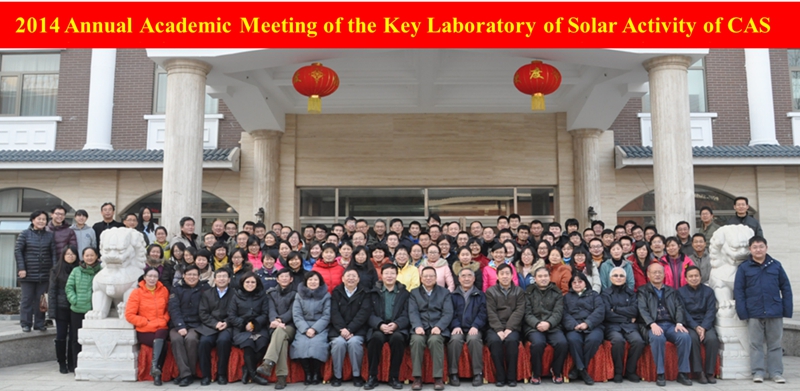In order to promote the academic collaborations and communications on researches of solar activities and the related new technology on solar observations, the Key Laboratory of Solar Activity (KLSA) of CAS organized the Annual Academic Meeting at the end of each year since 2009. The 2014 Annual Academic Meeting of KLSA was successfully held in Huairou, Beijing in January 13-15, 2015.
The director of KLSA, prof. Yihua Yan made the annual report of 2014, introduced the main developments of the laboratory in the year of 2014 and pronounced that the construction of the new generation Chinese Solar Radio Heliograph (CSRH) has been finished in Inner Mongolia, and the Key project of “Advanced infrared magnetic field measure system (AIMS)” has been approved by NSFC. These developments may provide a big opportunity for the upcoming researches on solar activities for solar physicists in China and in the world.
The CAS academician prof. Jingxiu Wang, and Prof. Dean-Yi Chou who comes from Taiwan National Tsing Hua University with other 49 participants presented their reports. These reports covered the main progresses of solar physics key projects, new technology of solar observations, solar magnetic fields and the evolution, solar bursts and magnetic reconnections, coronal heating, oscillations and waves, solar activity cycle, the prediction of solar activity and other related topics. They introduce the up-to-date results in their research domain. Especially, the recent results from CSRH and the one-meter New Vacuum Solar Telescope (NVST) in Fuxian Lake are stirring great interesting among the participants.
There are 133 participants attending this meeting, who come from more than 20 research groups of 8 universities and 8 institutes. Participants also include some directors of administrative departments of CAS and NAOC and the editor office of Chinese Science Bulletin. Dr. Keiji Hayashi, who comes from Japan and is a visiting scholar in KLSA, also presents a report in the meeting. All participants take part in the discussions on the frontier topics of solar physics and observations.














